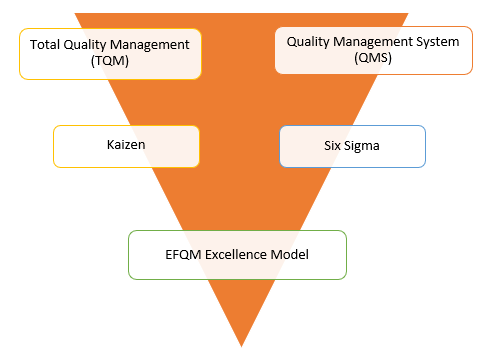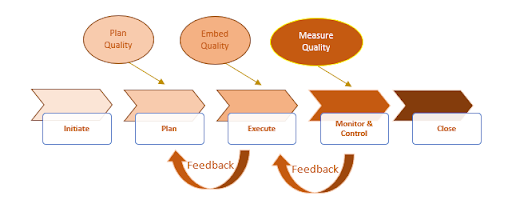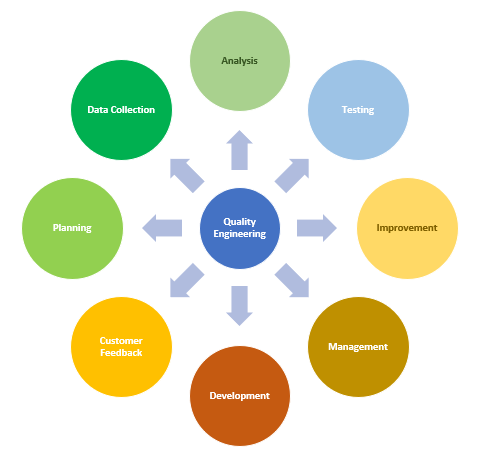Quality Engineering : From Everything About It to the Kind of Job Roles in the Field.
Introduction
Are you hearing the term "Quality Engineering" for the first time? Does it sound like a cool, but vague term that could mean just about anything? Well, let's dissect the term. Quality is the first word. In the field of Quality Management, Quality specifically refers to "Fitness for Use", and the quality of a product or service can be inferior or superior compared to another. Or it could comply or fail to comply with a standard.
Onto the next word in the term, Oxford Languages defines engineering as "the action of working artfully to bring something about". That "something", if it works, is incorporated into a process or service. Quality Engineering is thus a field of work where solutions are created in a manner that meets the necessary standards.
Today everyone wants to gain customers. The competition is high and everything needs to be quick and efficient. Among all this to gain and retain customers, we need to ensure good quality of the service is provided and the products we make!! For emerging technologies, the old system of quality control and testing is not enough. Hence businesses have started using Quality Engineering Services!! This is something new and is required in today’s emerging technological landscape.
What is Quality Engineering?
Quality engineering is a discipline of engineering. It is concerned with the practice and principles of product and service quality assurance and control. If you look at software development. It is the management, development, maintenance, and operation of IT systems. This includes enterprise architectures with a high-quality standard.
Now, introducing you to the testing methodology, named “Quality engineering”. This can reduce costs and improve productivity in parallel. What is quality engineering (QE)? How does it differ from traditional quality control? Let’s find out.
You need to ensure services or products are designed, developed, and manufactured to meet or exceed the customer’s expectations. Quality Engineering includes development systems and analysis methods for this. Quality Engineering encloses all tasks from ideation to execution. These would include the analysis of a product’s design, its development, and finally the manufacturing processes. The focus is on improving the quality of the final product and an efficient production process. It includes identifying and reducing waste in different forms. Quality Engineering tools and methods are often developed and implemented using a cross-functional approach. It involves many business and engineering disciplines. Quality Engineering has a broad range of tools and methodologies. A few of these are given below. However, this is a limited list and we can include more:
- Implementation of Quality Management System (QMS)
- Use of Advanced Product Quality Planning (APQP) tools from the design concept, checking to manufacture, and finally monitoring of the finished product. Tools like Failure Mode and Effects Analysis (FMEA) and Quality Function Deployment (QFD) are useful here
- Integrate Voice of the customer (VOC) into new product designs and processes. House of quality can be used here
- Identify and eliminate waste in business and manufacturing processes
- Collaborate with internal and external suppliers to ensure materials, assemblies and components meet the quality and design requirements
- Implementation of process controls such as Statistical Process Control (SPC)
- Fix root causes: Work with customers to resolve any quality issues through the application of Problem-Solving tools such as 8D, 5 Why, Cause and Effect / Ishikawa diagrams etc. Implementing effective Root Cause Analysis (RCA) measures to prevent the issue from re-occurring
- Ensure process controls are effective by developing of appropriate testing methods and inspections
Quality Engineering Process
Quality Engineering in Software
How do you measure the quality of IT services? It could be customer satisfaction, the average time to resolution, and system downtime. There are other criteria too. These consist of subjective and objective opinions. The focus is on functions, reliability, usability, and security. To cater to these criteria, QE integrates methods and tools taken from various disciplines, like enterprise architecture and product management, information security management, software and systems engineering, etc.
Here is a list of the most popular philosophies and tools encompassed by QE:
- Quality Management System (QMS)
- Total Quality Management (TQM)
- Kaizen
- Six Sigma
- EFQM Excellence Model (Concept for business excellence developed by the European Foundation for Quality Management)

Popular Quality Engineering Tools
Organizations all over the world and across various industries implement the above-mentioned techniques. This helps them reduce the number of faults. The result is the best output in sync with customer requirements. Below is a quick snapshot of how quality engineering aligns with a typical SDLC cycle.

Quality Engineering aligned to SDLC
Quality Engineers
Quality Engineers are the torchbearers here. They develop & maintain the various quality disciplines in the world of Quality Engineering. They are professionals who have a deep understanding of quality principles. They understand process evaluation and control too. A quality Engineer is sometimes called a Quality Assurance Engineer. They are responsible for developing, implementing, and maintaining quality systems. These systems measure, monitor, and control product quality. This includes process quality in the production process too. They are responsible for embedding quality standards in products and associated production processes. To achieve this, they work across various departments of the organization.

They interact from design teams to manufacturing teams and beyond. Quality Engineers must know the use of SPC in monitoring the manufacturing processes. They should understand process capability too. They often determine the parameters and develop appropriate end of line testing. They set the acceptable limits for the results here. Quality Engineers must be well acquainted with the use and application of problem-solving tools. They should be experts in process improvement and troubleshooting. A Quality Engineer must be able to understand and discover the process issues. This will enable them to develop effective countermeasures including process or product changes. These are necessary to ensure that quality standards are upheld. The results are that the customer’s requirements and expectations are met or exceeded.
Quality Engineer Jobs
Let us have a quick look at some quality engineering jobs and what are the responsibilities that come with the jobs
Senior Quality Engineer:
Job Description -
- Involving in Business Requirement gathering for upcoming project discussions.
- Interact with the onshore/offshore Business Partners for the Testing activities.
- Analyze, Develop, and implement efficient and effective Test Plans/Test Cases/Test Data for the new state-specific requirements and enhancements
- Test Execution of Facets Online/Extensions/Interfaces/Letters/Reports and web services
- Design and implement automated tests in an ATDD (Acceptance Test Driven Development) setting
- Test web applications and IT solutions using formal software test practices and leverage automation
- Write and execute automated tests using UFT, Cucumber, Selenium/Java, or similar tools
- Deliver test automation solutions within the development and operational guidelines and in accordance with enterprise standards
The quality Engineer salary range for this: Rs. 5.1 to 8.4 lakhs per annum. This may however vary based on experience, industry, and country.
Quality Engineer:
Job Description -
Role: QE Engineer with API Automaton and Java skills
- Strong and hands-on Java (knowledge of Java11 and Java8 features)
- Minimum experience: 4+ years of test automation and Java skills (SDET role)
- Strong concepts on OOP
- REST API automation and API knowledge
- TestNG/Junit
- Manual API testing, Tool: Postman
- Very strong QA/testing acumen
- Should be willing to learn
- Excellent written and verbal communications skills
- Experience in Agile methodology in fast-paced environments
- Good exploratory testing skills
- Must strive for product excellence and be detail-oriented
- Deep understanding of QA practice and methodologies
- Success in team environments, accountability with other team members, and demonstrating shared responsibility
- Ability to make decisions and excellent prioritization skills
The quality Engineer salary range for this: Rs. 2.4 to 9 lakhs per annum. This may however vary based on experience, industry, and country.
Quality Engineering Services
Various quality services are provided by IT outsourcing companies. QE services can be divided into three groups.
1. Consulting
Organizations may want to identify areas they need to improve in and make a strategic plan for achieving that. QE consulting will help do this. This will include subject-matter consultants from the industry and aligned to quality initiatives. General steps will include:
- Analyze the current status of the organization
- Understand improvement areas and how QE can be effective
- Make a strategic plan for introducing QE
- Execute the plan and make templates and documents necessary for it
2. Training
Training is the key to sustainability. Proper training conducted by highly qualified specialists would prove to be the most powerful tool here. If you are going to introduce QE methodology, take the time to provide professional and effective training for your teams.
There can be different options:
- Offsite training: Conduct course at a vendor’s training center. Will have a higher level of engagement
- Onsite training: Conduct courses on your organization premises in a working environment
- Online training: These are independent courses. Can be done remotely (Live) or recorded videos which you can access anytime and anywhere
3. Support
A quality management system is a long-term strategic plan. It takes time to build and may require professional support at any moment. Qualified vendors can provide a significant amount of relevant information and resources. These will help to address any issues that may arise. QE support is needed to analyze problems & solve them. Will help to audit production, and successfully achieve goals.
Conclusion
There are enormous benefits of Quality Engineering. QE can have a profound effect on process efficiency and product quality. Will have a positive impact on customer satisfaction. Voice of Customers (VOC) is heard through the effective use of Quality Engineering methods and tools. These are used during the product conception, development, and implementation processes. Embed this into the product design, such that quality is designed and built into the product. Waste is identified and eliminated in the manufacturing processes. Quality Engineering techniques should be properly implemented using appropriate tools. This can have a huge impact on product quality and cost. Eventually, these benefits will be seen in the organization’s bottom line.
Become a certified Quality Management Professional.

